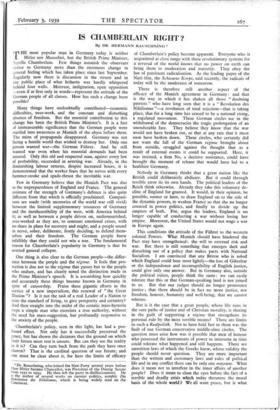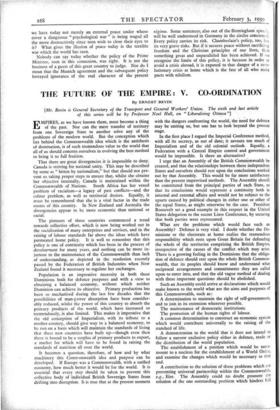IS CHAMBERLAIN RIGHT ?
By DR. HERMANN RAUSCHNING *
THE most popular man in Germany today is neither Hitler nor Mussolini, but the British Prime Minister, Neville Chamberlain. Few things astonish the observant visitor to Germany more than the enormous change in general feeling which has taken place since last September. Regularly now there is discussion in the streets and in any public place of what hitherto was hardly whispered behind four walls. Mistrust, indignation, open opposition —even if at first only in words—represent the attitude of the German people of all classes. How has such a change been possible?
Many things have undoubtedly contributed—economic difficulties, over-work, and the constant and disturbing absence of freedom. But the essential contribution to this change has been the British Prime Minister's. It is a fact of immeasurable significance that the German people were startled into awareness at Munich of the abyss before them. The mists of propaganda disappeared. Germany was not facing a hostile world that wished to destroy her. Only one person wanted war—the German Fiihrer. And he still wanted war even when his essential demands had been assured. Only this old and respected man, against every law of probability, succeeded in averting war. Already, in the diminishing labour returns, despite increased hours, it is demonstrated that the worker fears that he serves with every hammer-stroke and spade-thrust the inevitable vi ar.
Few in Germany believe that the Munich Pact was due to the unpreparedness of England and France. The general estimate of the strength of Germany's defence is also quite different from that which is officially proclaimed. Compari- sons are made (with memories of the world war still vivid) between the limited supplementary resources of Germany and the inexhaustibility of the west, with America behind it; as well as between a people driven on, undernourished, over-worked as they are, to constant emotional crises, with no share in plans for recovery and might, and a people sound in nerve, sober, deliberate, freely deciding, to defend them- selves and their freedom. The German people knew infallibly that they could not win a war. The fundamental reason for Chamberlain's popularity in Germany is that he averted general collapse.
One thing is also clear to the German people—the differ- ence between the people and the regime. It feels that pro- tection is due not to the regime that passes but to the people who endure, and has clearly noted the distinction made in the Prime Minister's speech. It is astonishing how quickly and accurately these things become known in Germany in spite of censorship. Praise these gigantic efforts in the service of a new imperialism, this renewal of " the Great Illusion "? Is it not the task of a real Leader of a Nation to raise the standard of living, to give prosperity and certainty? And then straight into the midst of the ecstatic mass-hysteria steps a simple man who exercises a true authority, without the need for mass-suggestion, but profoundly responsive to the anxiety of the people.
Chamberlain's policy, seen in this light, has had a pro- found effect. Not only has it successfully preserved the peace, but has shown the dictators that the ground on which their future must rest is unsure. But can they see the reality as it is? Can they turn back from the path they have once chosen? That is the cardinal question of our future; and one must be clear about it, for here the limits of efficacy *Dr. Rauschning, who joined the Nazi Party several years before Herr Hitler became Chancellor, was President of the Danzig Senate from 1932 to 1934. He then left the party in disillusionment. He is the author of several works on current politics, notably Die Revolution des Nihilismus, which is being widely read on the Continent. of Chamberlain's policy become apparent. Everyone who is acquainted at close range with these revolutionary systems for a reversal of the world knows that no power on earth can bring them to moderation and maturity. They obey the law of persistent radicalisation. As the leading paper of the Nazi elite, the Schwarze Korps, said recently, the radicals of today will be the moderates of tomorrow.
There is therefore still another aspect of the efficacy of the Munich agreement in Germany : and that is the way in which it has shaken all those " doubting patriots " who have long seen that it is a " Revolution des Nihilismus "—a revolution of total rejection—that is taking place, that for a long time has ceased to be a national rising, a regulated movement. These German circles see in the withdrawal of the democracies the tragic prolongation of an unendurable fate. They believe they know that the war would not have broken out, or that at any rate that it must soon have broken down. These circles, who certainly did not want the fall of the German regime brought about from outside, struggled against the thought that as a result of external events it could be supported. Here, it was insisted, a firm No, a decisive resistance, could have brought the moment of release that would have led to a healthier Germany.
Nobody in Germany thinks that a great nation like the British could deliberately abdicate. But it could through terrible error tie its own hands. The political leaders of the Reich think otherwise. Already they take this voluntary de- cline of England for granted. It would, in their opinion, be possible, sooner or later, to draw England on to the side of the dynamic powers, to weaken France so that she no longer counted in power politics, and finally to divide up the empires of both. For, argue the leaders, England is no longer capable of conducting a war without losing her empire. Moreover, the United States would not wage a war in Europe again.
This conditions the attitude of the Fiihrer to the western colonial Powers. What Munich should have hindered the Pact may have strengthened: the will to external risk and war. But there is still something that emerges dark and disturbing out of a policy that makes pacts with National Socialism. I am convinced that any Briton who is asked which England could bear most lightly—the loss of Gibraltar or the independence and incorruptibility of English justice, could give only one answer. But in Germany also, outside the political rulers, people think the same: we can easily tolerate that this or that German-speaking land is not joined to us. But that our judges should no longer pronounce justice ; that there should be in fact no more justice, nor freedom, honour, humanity and well-being, that we cannot tolerate.
But is it the case that a great people, whose life runs in the sure paths of justice and of Christian morality, is sharing in the guilt of supporting a regime that strengthens its personal rule by the most terrible means? There are limits to such a Realpolitik. Not to have held fast to them was the fault of our German conservative middle-class circles. The question must arise how was it possible that men of honour who possessed the instruments of power to intervene in time could tolerate what happened and still happens. There are unwritten laws of which the Greeks knew, whose validity the people should never question. They are more important than the written and customary laws and rules of political life and in any conflict there can be only one outcome. What does it mean not to interfere in the inner affairs of another people? Does it mean to close the eyes before the fact of a terrible and deadly crisis which today threatens the moral basis of the whole world ? We all want peace, but is what we have today not merely an external peace under whose cover a dangerous " psychological war " is being waged all the more destructively since men wish to close their eyes to it? What gives the illusion of peace today is the terrible war which the world has seen.
Nobody can say today whether the policy of the Prime Minister, seen in this connexion, was right. It is not the business of a guest of this great country to judge. Nor do I mean that the Munich agreement and the subsequent policy betrayed ignorance of the real character of the present regime. Some sentences, also out of the Birmingham spec:'.:, will be well understood in Germany in the circles concerns I. Every policy carries its risk. Chamberlain's policy, too, Lls its very grave risks. But if it secures peace without sacrifice g freedom and the Christian principles of our lives, th,n something great and unparalleled has been achieved. If we recognise the limits of this policy, it is because in order to avoid a crisis abroad, it is exposed to that danger of a revo- lutionary crisis at home which is the fate of all who make pacts with nihilism.











































 Previous page
Previous page